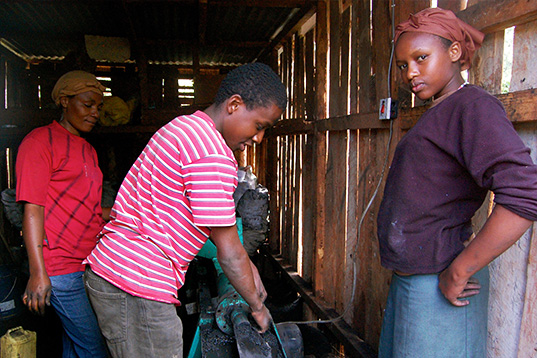> Click to download full issue <
EDITORIAL
This issue of ENERGIA News (EN) is the first for some months. However, this is not a sign that the network has been inactive – far from it! ENERGIA has being finalising a successful phase four and starting a fifth phase. During phase four, one of the successes linked to advocacy on gender and energy has been the pleasing sight of more organisations adopting gender approaches in their work. For example, the World Bank’s African Renewable Energy Access (AFREA) programme is active in six African countries, working with utilities and rural energy agencies to develop their institutional
capacity to carry out gender assessments and develop gender action plans. The Norwegian Development Agency, Norad, has also been mainstreaming gender in its energy programmes, including in the petroleum sector. This can be considered ground-breaking since many question whether there are gender issues in oil. The work ENERGIA has done for Norad has shown that, clearly, there are gender issues in the local impacts of petroleum development and in community development projects: women will generally be more negatively affected than men. The sector is also missing out on a pool of talent by not recruiting and retaining women engineers and scientists.
Another organisation that has also started to specifically mainstream gender in its work is the UK-based charity Ashden, which supports pioneers in sustainable energy to accelerate the transition to a low-carbon world. Since 2001, Ashden has been recognising these efforts through its awards scheme. This year, Ashden specifically allocated one of its awards to an organisation that has demonstrated, through its business approach, increased access by women to clean energy – both as consumers and in the supply and distribution chain. In this issue of EN, we highlight both the winner of the award (Greenway Grameen Infra – GGI) and some other inspiring stories of young energy entrepreneurs recognised by Ashden. GGI has learnt from and acted upon an important lesson of so many failed stoves programmes – that if you do not involve women in the design of the stove they will not be adopted. Selling an improved stove for US$23, which is a considerable investment for households in rural India, is no mean feat. In three years, GGI has sold 120,000 stoves which must mean that they have got something right, and we are certain that it is involving rural women, the potential end-users, in the design.
One of the major activities for ENERGIA during phase five will be supporting enterprises promoting access to clean energy. Although we will continue with our advocacy and policy-influencing initiatives, we are taking new steps by supporting initiatives that promote women’s access to clean energy on a much larger scale than we have in the past. Over the course of three years, we aim to empower 3000 women entrepreneurs in the delivery of energy services, thereby reaching over 2,000,000 consumers in Asia and Africa. In this issue of EN, we introduce the five partner organisations that we are supporting. This work is part our commitment to the UN Sustainable Energy for All (SE4All) initiative.
ENERGIA is strengthening its advocacy and policy-influencing efforts through another new endeavour: generating robust empirical evidence to better understand what works and what does not work when it comes to energy sector investments aimed at addressing women’s specific needs for modern energy services. Much of the existing evidence is based on case studies which, while providing very useful insights, often focus on women and leave men out of the picture. However, we know men also play an important role in sustainable energy access in households and enterprises, and so we need to include them in the evidence. We need to understand whether policy processes in the energy sector, such as tariff reform, have gendered effects in access to clean energy. In this context, ENERGIA is starting a major five-year research programme, funded by the UK Department for International Development (DFID), which will provide a body of evidence to help formulate effective interventions.
ENERGIA News guest editors
Joy Clancy, Associate Professor, University of Twente and Principal Investigator ENERGIA Gender and Energy Research Programme
Sheila Oparaocha, ENERGIA International Coordinator and Programme Manager







